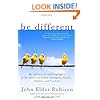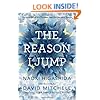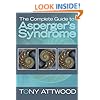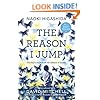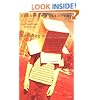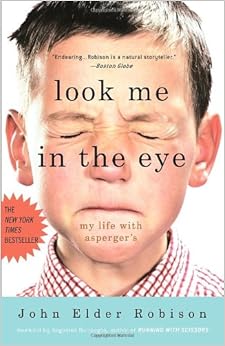
Look Me in the Eye: My Life with Asperger's
and over one million other books are available for Amazon Kindle. Learn more


Flip to back
Flip to front


Look Me in the Eye: My Life with Asperger's Paperback – September 9, 2008
See all 18 formats and editions
Hide other formats and editions
| Amazon Price | New from | Used from |
|
Audio CD, Unabridged, Audiobook
"Please retry"
|
—
|
$196.90 | $159.99 |
|
Unknown Binding
"Please retry"
|
—
|
— | — |

$8.64
FREE Shipping on orders over $35.
In Stock.
Ships from and sold by Amazon.com.
Gift-wrap available.
NO_CONTENT_IN_FEATURE
Start reading Look Me in the Eye: My Life with Asperger's on your Kindle in under a minute.
Don't have a Kindle? Get your Kindle here, or download a FREE Kindle Reading App.
Don't have a Kindle? Get your Kindle here, or download a FREE Kindle Reading App.
Choose Your Own Autobiography
Step right into Neil Patrick Harris's shoes in an exciting, interactive autobiography that places the reader squarely in the driver's seat. Learn more
Step right into Neil Patrick Harris's shoes in an exciting, interactive autobiography that places the reader squarely in the driver's seat. Learn more
Product Details
Would you like to update product info or give feedback on images?.
|
Editorial Reviews
From Publishers Weekly
Starred Review. Robison's thoughtful and thoroughly memorable account of living with Asperger's syndrome is assured of media attention (and sales) due in part to his brother Augusten Burroughs's brief but fascinating description of Robison in Running with Scissors. But Robison's story is much more fully detailed in this moving memoir, beginning with his painful childhood, his abusive alcoholic father and his mentally disturbed mother. Robison describes how from nursery school on he could not communicate effectively with others, something his brain is not wired to do, since kids with Asperger's don't recognize common social cues and body language or facial expressions. Failing in junior high, Robison was encouraged by some audiovisual teachers to fix their broken equipment, and he discovered a more comfortable world of machines and circuits, of muted colors, soft light, and mechanical perfection. This led to jobs (and many hilarious events) in worlds where strange behavior is seen as normal: developing intricate rocket-shooting guitars for the rock band Kiss and computerized toys for the Milton Bradley company. Finally, at age 40, while Robison was running a successful business repairing high-end cars, a therapist correctly diagnosed him as having Asperger's. In the end, Robison succeeds in his goal of helping those who are struggling to grow up or live with Asperger's to see how it is not a disease but a way of being that needs no cure except understanding and encouragement from others. (Sept.)
Copyright © Reed Business Information, a division of Reed Elsevier Inc. All rights reserved. --This text refers to an out of print or unavailable edition of this title.
Copyright © Reed Business Information, a division of Reed Elsevier Inc. All rights reserved. --This text refers to an out of print or unavailable edition of this title.
From Booklist
*Starred Review* If one looked at only Robison's impish sense of humor (he once ordered a blow-up sex doll to be delivered to his junior-high-school teacher—at school), or his success as a classic-car restorer, it might be impossible to believe he has the high-functioning form of autism spectrum disorder called Asperger's syndrome. Clues abound, however, in his account of a youth encompassing serious inability to make and keep friends; early genius at pyrotechnics, electronics, and math; and pet names such as Poodle for his dog and Snort and Varmint for his baby brother. Much later, he calls his wife Unit Two. It is easy to recognize these telltale traits today, but Robison went undiagnosed until he was 40. In the 1960s, he was variously labeled lazy, weird, and, worse, sociopathic. Consequently, his childhood memories too often read like a kid's worst nightmares. Not only did his parents fail to understand the root of his socialization problems but they were also virtually as dysfunctional as the pair Augusten Burroughs portrays in Running with Scissors (2002). 'Nough said? Not nearly. Robison's memoir is must reading for its unblinking (as only an Aspergian can) glimpse into the life of a person who had to wait decades for the medical community to catch up with him. Chavez, Donna
--This text refers to an out of print or unavailable edition of this title.
More About the Author
John Elder Robison is a free range Aspergian male who grew up in the 1960s before the Asperger diagnosis came into common use. After dropping out of high school, John worked in the music business where he created sound effects and electronic devices, including the signature illuminated, smoking, and rocket firing guitars he built for KISS. Later John worked on some of the first video games and talking toys at Milton Bradley. After a ten year career in electronics John founded Robison Service, a specialty automobile company in Springfield, Massachusetts.
Robison Service grew to be one of the largest independent restoration and service specialists for BMW, Bentley, Jaguar, Land Rover, Mercedes, and Rolls Royce cars. The company has become one of the top-ranked Bosch Car Service centers in North America.
However, that wasn't enough. John wanted to do more; to find a way to give something back to other misfit kids who struggle to find their way in the world. Inspired by the reception of his brother's book Running With Scissors, John began speaking to groups of young people, and a year or two later, he decided to write a book. That book, Look Me in the Eye, was an instant bestseller.
John was launched on a new career, in addition to his successful car company.
When he's not at Robison Service, John now serves as an adjunct faculty in the department of Communication Sciences and Disorders at Elms College in Chicopee, Massachusetts. He has served as a panel member for the Institute for Autism Research, The Centers for Disease Control, The National Institutes of Mental Health and Autism Speaks. John is involved in TMS autism research at Harvard Medical School and Beth Israel Deaconess Medical Center, and serves on the advisory board for Mass General Hospital's YouthCare program.
John is very active in his efforts to support and promote research leading to therapies or treatments that will improve the lives of people who live with autism in all its forms today. John is widely known as an advocate for people with autism and neurological differences.
John is the author of Look Me in the Eye, my life with Asperger's, and Be Different, Adventures of a free-range Aspergian. John's writing has been translated into ten languages and his work is sold in over 60 countries. His writing also appears in a number of magazines and he's a regular blogger on Psychology Today.
In addition to his autism advocacy work, John is a lifelong car enthusiast, an avid hiker, a photographer, a music lover, and a world-class champion eater. He lives in Amherst, Massachusetts.
Find John on the web:
www.robisonservice.com - the car company
www.johnrobison.com - John's personal site
jerobison.blogspot.com - John's blog
JohnElderRobison - on Facebook
@johnrobison - on Twitter
Robison Service grew to be one of the largest independent restoration and service specialists for BMW, Bentley, Jaguar, Land Rover, Mercedes, and Rolls Royce cars. The company has become one of the top-ranked Bosch Car Service centers in North America.
However, that wasn't enough. John wanted to do more; to find a way to give something back to other misfit kids who struggle to find their way in the world. Inspired by the reception of his brother's book Running With Scissors, John began speaking to groups of young people, and a year or two later, he decided to write a book. That book, Look Me in the Eye, was an instant bestseller.
John was launched on a new career, in addition to his successful car company.
When he's not at Robison Service, John now serves as an adjunct faculty in the department of Communication Sciences and Disorders at Elms College in Chicopee, Massachusetts. He has served as a panel member for the Institute for Autism Research, The Centers for Disease Control, The National Institutes of Mental Health and Autism Speaks. John is involved in TMS autism research at Harvard Medical School and Beth Israel Deaconess Medical Center, and serves on the advisory board for Mass General Hospital's YouthCare program.
John is very active in his efforts to support and promote research leading to therapies or treatments that will improve the lives of people who live with autism in all its forms today. John is widely known as an advocate for people with autism and neurological differences.
John is the author of Look Me in the Eye, my life with Asperger's, and Be Different, Adventures of a free-range Aspergian. John's writing has been translated into ten languages and his work is sold in over 60 countries. His writing also appears in a number of magazines and he's a regular blogger on Psychology Today.
In addition to his autism advocacy work, John is a lifelong car enthusiast, an avid hiker, a photographer, a music lover, and a world-class champion eater. He lives in Amherst, Massachusetts.
Find John on the web:
www.robisonservice.com - the car company
www.johnrobison.com - John's personal site
jerobison.blogspot.com - John's blog
JohnElderRobison - on Facebook
@johnrobison - on Twitter
Related Media
Customer Reviews
Most Helpful Customer Reviews
173 of 191 people found the following review helpful
By
John H. Hastings
on September 26, 2007
Format: Hardcover
Verified Purchase
9 Comments
Sending feedback...
I bought Look Me in the Eye: My Life with Asperger's by John Elder Robison mainly because I was enticed by reviews and interviews to explore the mind of someone who (because of Asperger's Syndrome) thinks a bit differently from us so-called "regular" folks. The book centers on John's struggle to become socially and economically successful as a person with Asperger's Syndrome. His condition wasn't diagnosed until he turned 40.
The two main things about this book that stood out for me (from beginning to end) were: (1) Mr. Robison doesn't give many clues about how he expects the reader to react to his stories. In other words, you get to make your own judgments - whether about his legal and illegal pranks or about his decision to not get involved with groupies (for two examples). He doesn't spend much time defending his behavior and he isn't dogmatic about what's right and what's wrong. (2) He thinks a lot and in unusual ways. As I read about his sometimes-elaborate thought processes, I remembered what a friend told me long ago: "If you're confused, good! It means you're thinking!" And I pondered some of the social conflicts in my own life caused by what others have characterized as "thinking too much."
In chapter 26 "Units One Through Three," Mr. Robison hilariously describes in frank terms the thought processes he went through when choosing his wife. ("Choosing" isn't the right word, but I promised myself I wouldn't write any spoilers into my review.Read more ›
The two main things about this book that stood out for me (from beginning to end) were: (1) Mr. Robison doesn't give many clues about how he expects the reader to react to his stories. In other words, you get to make your own judgments - whether about his legal and illegal pranks or about his decision to not get involved with groupies (for two examples). He doesn't spend much time defending his behavior and he isn't dogmatic about what's right and what's wrong. (2) He thinks a lot and in unusual ways. As I read about his sometimes-elaborate thought processes, I remembered what a friend told me long ago: "If you're confused, good! It means you're thinking!" And I pondered some of the social conflicts in my own life caused by what others have characterized as "thinking too much."
In chapter 26 "Units One Through Three," Mr. Robison hilariously describes in frank terms the thought processes he went through when choosing his wife. ("Choosing" isn't the right word, but I promised myself I wouldn't write any spoilers into my review.Read more ›
Thank you for your feedback.
If this review is inappropriate, please let us know.
Sorry, we failed to record your vote. Please try again
444 of 503 people found the following review helpful
By
Elizabeth A. Littlepage
on October 14, 2007
Format: Hardcover
56 Comments
Sending feedback...
A warning about this book: Asperger's Syndrome is not quite what the author makes it out to be. If you were to only learn about the diagnosis from this memoir, here is what you might expect: "symptoms" that include amazingly innovative genius and a life of non-stop social and financial success.
The author: 1. makes numerous friends during adolescence, finding (as he describes it) acceptance and comfort in the music scene of his community. 2. makes a romantic connection during this time, sustaining a long-term relationship, including (later) marriage and a child. 4. states that he does not like small talk, does not like change. When does he become aware of this? As he is on tour with the worlds biggest rock band (He is reminded of his small-talk aversion later in the book...when he succeeds in the corporate world, functioning as both a creative asset and supervisor.) The biggest dilemma in the book: should he remain a business executive...or, should he open and run his own business?
Wow. Turns out that Asperger's is fun and empowering...assuming, of course, that you're a socially-adaptable techno-genius with highly marketable engineering skills.
'Look Me in the Eye' does make for a fascinating window into Asperger's Syndrome. However, if you are purchasing this book, please bear in mind: few people (and I mean very few people, including neuro-typicals) are as high-functioning as the author. This is a memoir by someone with Asperger's Syndrome, not an educational tool about it.
The author: 1. makes numerous friends during adolescence, finding (as he describes it) acceptance and comfort in the music scene of his community. 2. makes a romantic connection during this time, sustaining a long-term relationship, including (later) marriage and a child. 4. states that he does not like small talk, does not like change. When does he become aware of this? As he is on tour with the worlds biggest rock band (He is reminded of his small-talk aversion later in the book...when he succeeds in the corporate world, functioning as both a creative asset and supervisor.) The biggest dilemma in the book: should he remain a business executive...or, should he open and run his own business?
Wow. Turns out that Asperger's is fun and empowering...assuming, of course, that you're a socially-adaptable techno-genius with highly marketable engineering skills.
'Look Me in the Eye' does make for a fascinating window into Asperger's Syndrome. However, if you are purchasing this book, please bear in mind: few people (and I mean very few people, including neuro-typicals) are as high-functioning as the author. This is a memoir by someone with Asperger's Syndrome, not an educational tool about it.
Thank you for your feedback.
If this review is inappropriate, please let us know.
Sorry, we failed to record your vote. Please try again
90 of 104 people found the following review helpful
By
Roy Jaruk
on October 19, 2007
Format: Hardcover
Verified Purchase
1 Comment
Sending feedback...
People who suffer from Asperger's Syndrome view the world through very different eyes than do normal people. Things that seem perfectly mundane to normals take on a whole new appearance when someone with Asperger's looks at them. Aspergians (a term coined by Robison) do not pick up on the social cues and body language other people do. They don't think things that most people peceive as important matter; and things they believe are of vital importance are seen as inconsequential by normals.
Think for a minute about the sound of nails on a chalkboard. To many normals, the sound is something to make you grit your teeth and wish for its absence. To Aspergians, the sound can range from absolutely intolerable to pleasant, depending on how their particular affect of the syndrome perceives it. This difference in perception is one reason it's so hard for Aspergians to relate to the world.
John Elder Robison has given us a solid look at what it's like to be an Aspergian. He points out that the syndrome gives as well as takes. Although he had a difficult time as a child and adolescent only partly due to his Asperger's (he was afflicted with a pair of nutcase parents, which is the last thing anyone with Asperger's needs), his gifts for 'hearing' a sound and then being able to construct devices to make that sound a reality gave him successful careers as a tech wizard working with the sound systems and instruments of the rock group KISS, among others; and a successful career (as defined by the mundanes) as an engineer for Parker Brothers in the very early days of electronic games and early game consoles.Read more ›
Think for a minute about the sound of nails on a chalkboard. To many normals, the sound is something to make you grit your teeth and wish for its absence. To Aspergians, the sound can range from absolutely intolerable to pleasant, depending on how their particular affect of the syndrome perceives it. This difference in perception is one reason it's so hard for Aspergians to relate to the world.
John Elder Robison has given us a solid look at what it's like to be an Aspergian. He points out that the syndrome gives as well as takes. Although he had a difficult time as a child and adolescent only partly due to his Asperger's (he was afflicted with a pair of nutcase parents, which is the last thing anyone with Asperger's needs), his gifts for 'hearing' a sound and then being able to construct devices to make that sound a reality gave him successful careers as a tech wizard working with the sound systems and instruments of the rock group KISS, among others; and a successful career (as defined by the mundanes) as an engineer for Parker Brothers in the very early days of electronic games and early game consoles.Read more ›
Thank you for your feedback.
If this review is inappropriate, please let us know.
Sorry, we failed to record your vote. Please try again

